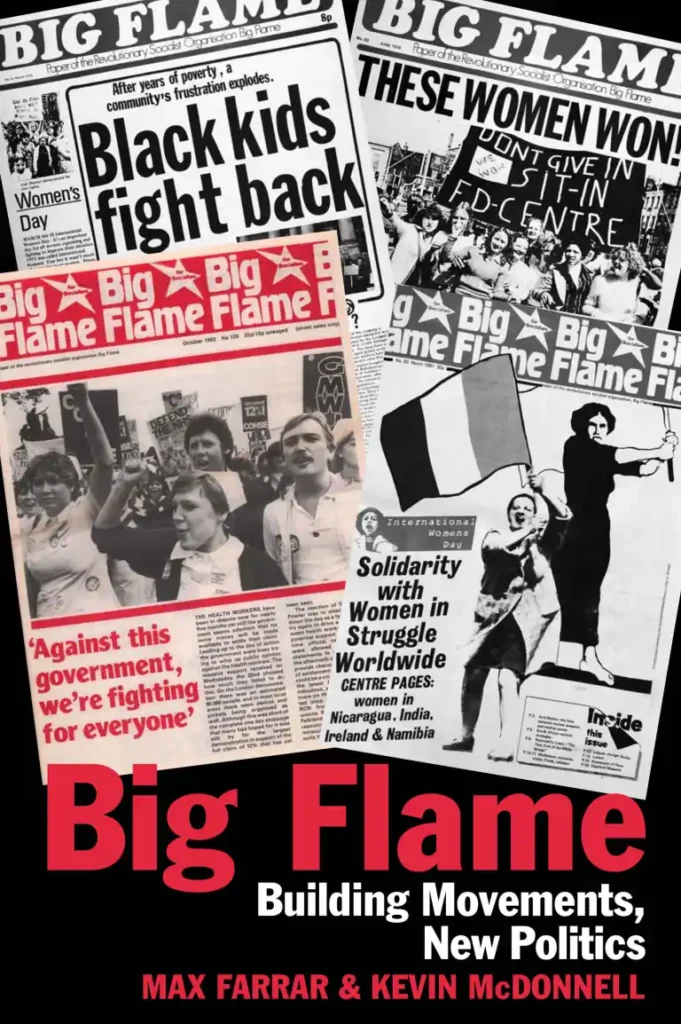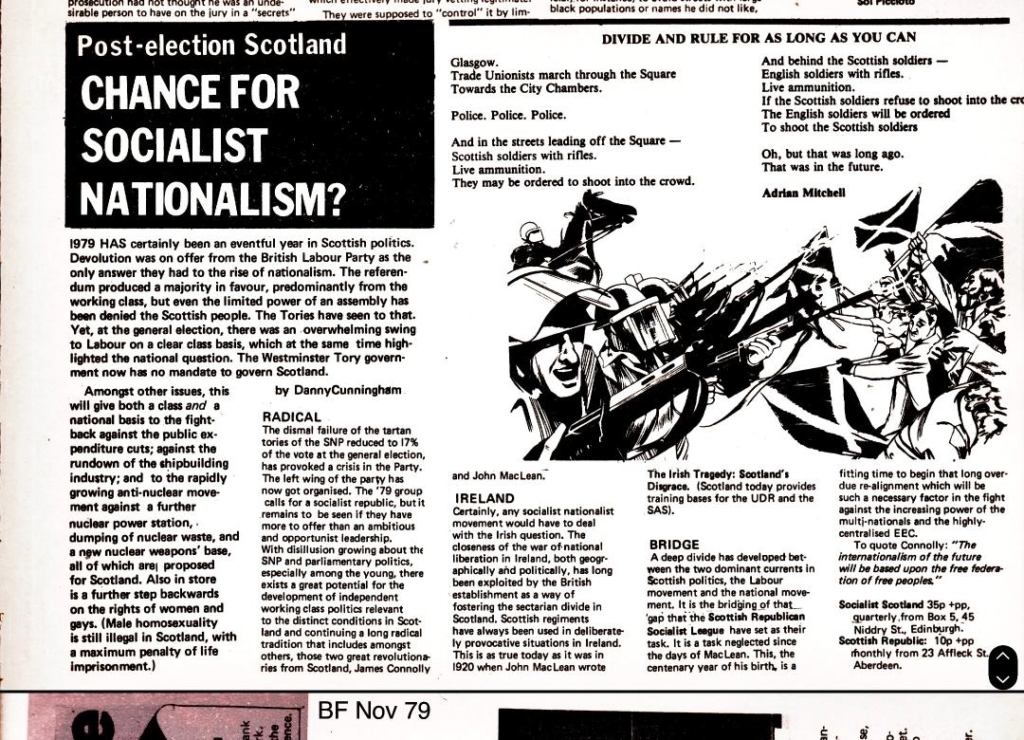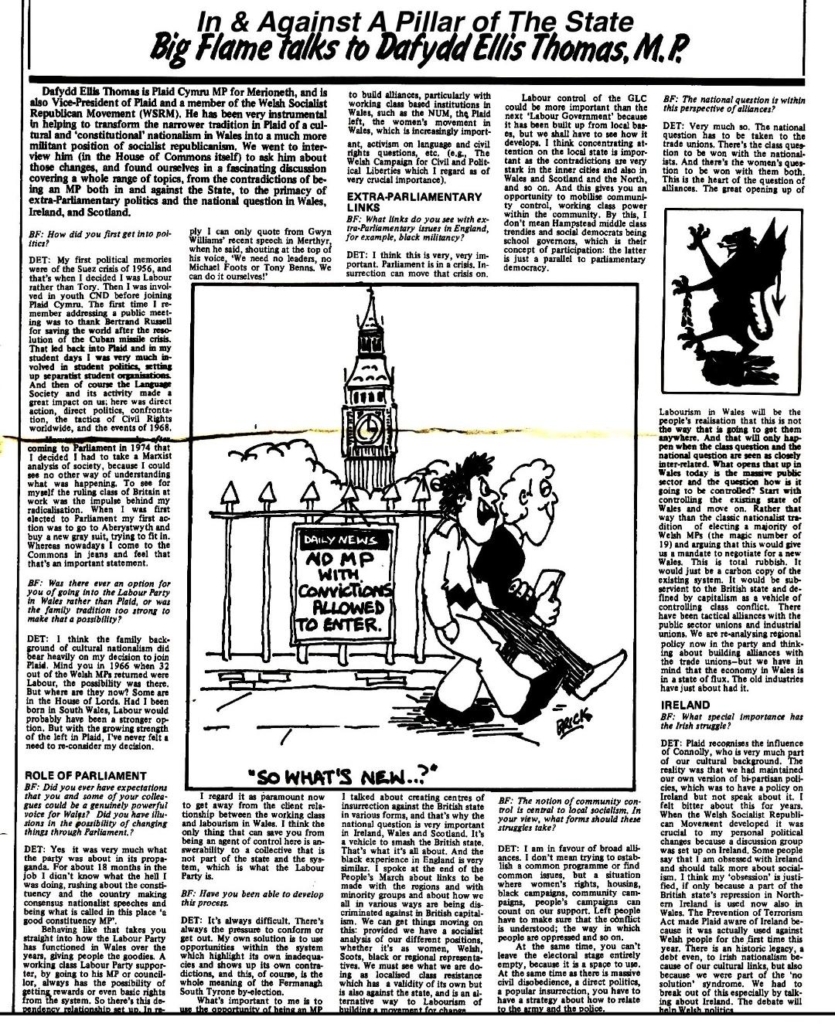Big Flame and Scottish & Welsh Republican Socialists 1979-1982
Davy Marzella reviews lessons from Big Flame, a libertarian socialist organisation in England in the 1970-mid 80’s and the questions it still raises about the relationship between socialist struggle, republicanism and nationalism. As he argues “It was a very short historical episode, but one that held some unfulfilled potential.”
Big Flame Building Movements, New Politics by Max Farrar & Kevin McDonnell published by Merlin Press 2024.

From the book’s back cover:
“This book, written by two former members, addresses the ideas and experiences of a small revolutionary socialist and feminist organisation. It reflects on influences (among them Italian Marxism, libertarianism, feminism) and critiques (of Leninism and Trotskyism) that helped shape Big Flame and its successes and failures. Many other former members write about their experiences in lively times and in harder times, after Margaret Thatcher won the 1979 election.”
They say: “Our book is aimed at those in the radical movements of every type who are seriously interested in political ideas and their relationship to political struggle. It seeks to assist all those who continue to challenge racist, patriarchal capitalism and to organise for a future where love and equality will prevail”.
Big Flame : Scottish & Welsh Autonomy ?

Tentative connections were explored between BF and Scottish Republican Socialist League (1979) and Welsh Socialist Republican Movement (1981).
This was also a time of intensification of the Irish Republican struggle against the British State in Ireland, with consequent tragic human loss for all involved, and some not involved.
BF centre pages on Scotland & Wales, Feb 1981

The following, from an article in BF paper of Nov 1979 , was written by London-based, Scottish member of BF after attending conference as supportive observer when Scottish Republican Socialist Clubs became SRSLeague.
( For clarification BF did not have any involvement at all in that decision )
– A deep divide has developed between the two dominant currents in Scottish politics – the Labour movement and the national movement.
It is the bridging of that gap that the Scottish Republican Socialist League have set as their task.
It is a task neglected since the days of John MacLean.
This, the centenary year of his birth, is a fitting time to begin that long overdue re-alignment which will be such a necessary factor in the fight against the increasing power of the multi-nationals and the highly-centralised EEC.
To quote James Connolly:
“the internationalism of the future will be based upon the free federation of free peoples.”
(BF paper Nov 1979)

SRSL members later attended as observers a meeting ‘For A Workers Europe’ convened in London by BF, as part of European-wide coalition of mostly non-Leninist Left, at the time of first European elections in 1979.
That coalition had some of the most significant revolutionary Marxist groupings in Europe,
at that time –
Ventresocialsterne (VS:Denmark)
Democrazia Proletaria (DP:Italy)
Movement Cominista (MC:Spain)
Kommunistischer Bund (KB:Germany),
Oganisation Communist de Travailleurs (OCT:France).
DP succeeded in getting a representative elected to the European Parliament, while VS and MC had representatives at national levels.
The coalition also included movements for national liberation in Ireland and Euskadi/Basque Country.
Scottish Republican Socialist Clubs/League
by Donald Anderson:
“The Scottish Socialist Republican Clubs were formed in 1973 as a cross-party organisation with a common unshakable and identifiable goal: Scottish Republican Socialism in the long term and support for Scottish Independence in the short term….
Some of us, including the late David Leadbetter and the late John Carlyle, came from the International Marxist Group (IMG). I first initiated MacLean’s Republicanism in their journal, the Red Mole, taken from an old Marxist quote –
“We recognise our old friend, our old mole, who knows so well how to work underground, suddenly to appear: the revolution.”
The decision to support a Scottish Workers Republic was taken at the next IMG Conference.
Tariq Ali needed no convincing, nor did Bob Purdie, their leading Scots theorist. Bob is now with SNP and mellowed slightly on the Marxist front. The third breakaway came in 1979 when some Club members decided to form the Scottish Republican Socialist League while some of the leading Club members were remanded in prison awaiting trial. The Clubs ran a loose structure, whereas the League wanted a tighter, centralised, almost party-like structure. I wasn’t opposed to it in principle. I just did not think we were ready.” More here.
Welsh Socialist Republican Movement
Report from the first congress of Welsh Socialist Republican Movement in Feb 1981, refers in introduction to the message of solidarity from Big Flame :
The founding Congress of the Welsh Socialist Republican Movement was held on February 28th and March 1st., 1981, at the Miners Institute, Hopkinstown near Pontypridd.
Sixty-eight members the Movement registered their attendance….
Delegates received messages of solidarity from M.I. R. – the Movement of the Revolutionary Left (Chile), the Scottish Republican Socialist League, the John Maclean Society and the English socialist organisation ‘Big Flame’. See here.


A prominent member of the Republican Movement in Ireland, through a BF intermediary, asked Dafydd Elis-Thomas to “move the writ” ( a parliamentary procedure necessary to initiate a bye-election ) for another bye-election in Fermanagh & South Tyrone after Bobby Sands MP had died on Hunger Strike in May 1981.
also including Ghanaian High-life band, Orchestre Jazira and the James Connolly Republican Flute Band from Glasgow, who gave an impromptu performance along Brixton High St., which was warmly received by the busy Saturday night public.
Bobby Sands had been elected MP while on Hunger Strike 9th April 1981, which happened to be the weekend of the Brixton Uprising.

Both SRSL & WRSM were short-lived, partly due to similar circumstances after police raids and arrests – including a BF member in London – and convictions of numerous members on “extra-curricular” charges.
By the early to mid 80’s, BF which had begun in 1970, came to an end as Thatcherite neoliberalism was becoming entrenched with the devastation which continues.

Were you aware Dafydd Ellis-Thomas died last week? A very strange political career.
No , I wasn’t aware…..he did have quite a strange political career.
I was quite surprised re-reading the interview here where he’s calling for insurrections against the
British state……..to later entering the house of lords
I remember him introducing the ‘Wolfe Tones’ at Deeside in 1982, in the middle of the Falklands war. Their song ‘Admiral William Brown’ (?) was causing a stir, to say the least. A tribute will be paid to him in the Senedd Tomorrow.
He was always a quite whimsical politician, genuinely personable though. He first drifted to the British Left (CND etc) in the mid 80s, and then became a passionate Europhile (having opposed the EEC in the 70s). When the Senedd (initially Assembly) was established, he rather ingratiated himself with English royalty – a body hated by many of us, as Welsh nationalism is more ethnic in nature than the Scottish variety. He did have a very clear vision for the strengthening and maturing of Welsh governance, something the Labour party had very little clue about. He fell out with Leanne Wood, an equally charismatic firebrand who by then ‘led’ Plaid Cymru. He then joined the Labour Government, but a couple of years ago was refused readmittal to Plaid Cymru. He had genuine friends who were political enemies, and vice-versa.
I first met him around 1980 and got to know him fairly well , visiting him and Plaid Cymru staff at one of the bars in Westminster .
He came under a lot of pressure not to move that bye-election writ , but did it none the less.
He not only spoke at Bobby Sands anniversary commemoration in London , but joined the full length of the March and came to the social in Brixton afterwards.
In the 1980s, Hugh Miller, a Scottish Republican Socialist originally from Perth, was an outstandingly effective organiser for the Campaign for a Scottish Assembly.
first encountered the big flame at the end of the ’60s. I was a shop steward in Pilkington’s Fibreglass factory in Possilpark, Glasgow. Pilkington took over Chance’s glassworks in Murano St in nearby Maryhill, named after the Murano works in Venice. The factory was shut down and moved to St Helen’s Lancashire after a six-week strike against the bosses, capitalists, Labour, and Tame Unions during (Lord) Wilson’s “Prices and incomes” policy. In other words, a Labour zero per cent Pay Freeze policed by the workers. Our Municipal Workers Tame Union Boss was Brother Baron Lord Cooper, whom we hated worse than Lord Pilkington and who was also given his Peerage by (Lord) Harold Wilson. The very limited 40-year MI5 disclosures admitted Lord Joe Gormley was an informant and had played a significant role in undermining the workers’ movement.
The industrial unrest was not merely about wages but was also a struggle for dignity and respect in the workplace. The factory closure in Murano St was a turning point, embodying the larger battle between the working class and the establishment. It was a time of great political and social upheaval, with the Labour government’s policies often seen as betraying the very workers they professed to support.
I see I have exceeded the number of characters allowed in my reply to the article and am posting it to you for safe keeping, to forward.
I remember when they shut the Glasgow factory with a Government grant to move to England. The other stewards phoned the St Helen’s stewards, whom they previously hosted, as speakers during the strike. “Every man for himself, Jock” was the response when asking for solidarity to stop the transfer of goods and machinery etc, to St Helens. The Convenor of GKN Nuts and Bolts factory, across the road Lord Martin, Labour late MP for Springburn and Speaker of the House, shop Steward for Labour MP’s expenses and perks, etc, “Gorbals Mick” was the convenor of GKN Nuts and Bolts a few streets away was given his reward in Labour heaven for keeping his workers in. His son, Paul, inherited the seat after his father’s death in true Labour style. The Red Mole and Big Flame gave their support. The Socialist Worker did too, ignoring the Glasgow plight, telling us to Vote Labour to get the Torres Out and to “Keep Kicking them”, when it was their turn to get in. I always argued with them in that. Not now. The SWP were parachuted into the Scottish Socialist Party to support the left Unionist platforms and oppose the SRSM. The SWP saw through this and went native and now support Scottish Independence
Sorry about the automatic length of reply Stuart, moderated now
Thanks for your contribution Stuart , and your long time dedication to maintaining a Scottish republican socialist tradition.
Short video update from current Big Flame Youth Project at Working Class Movement Library in Salford
https://www.facebook.com/reel/2084050225372741?fs=e&s=TIeQ9V&fs=e&fs=e
Why is there is stronger republican socialist traditions in Ireland , Scotland & Wales
than among the general “Left” in England ?
Comment received from anti-apartheid activist in Cape Town , Andre Marais –
“ Big Flame must have been an extraordinary publication ,
it was first introduced to me decades later by the late Big Flame activist Kate Truscott
who moved to Southern Africa in the 1990s .
I came across it when I worked in the Kate Truscott Library consisting of books
bequeathed by Kate for community activists.
Big Flame carried amazing articles on Irish Liberation and the anti apartheid struggle etc .
My Internationalism was very much informed by pieces I first read in pages of BIG FLAME .”
Great to see this piece get such a good reaction Davy
This is from Undercover Policing Inquiry ( Spycops )
– Special Branch report regarding the fracturing of the Welsh Socialist Republican Movement
by the arrest of activists
https://www.ucpi.org.uk/publications/special-branch-report-regarding-the-fracturing-of-the-welsh-socialist-republican-movement-by-the-arrest-of-activists-and-the-personal-arrangements-of-an-activist-2/
Numerous Special Branch reports on Big Flame from Undercover Policing Enquiry
https://www.ucpi.org.uk/search-results/?fwp_search=%22big+flame%22&fwp_paged=1#grid
Some further thoughts on The Question of England.
Many on the Left , say they are not nationalists but internationalists.
I agree with that sentiment , but does the term inter-nationalist , not imply
some form of connection between (inter) “nationalists”, or at least – between “nationalities” –
or those currently located within existing “nations” ?
Could transnationalist be a more accurate term – over and beyond existing nations & nationalities ?
It can be said that “nations” are an illusion – being forged in the interests of the ruling-class
downwards in the imagi-nation of imagined communities.
But national identity can also contribute to a profound sense of (imagined) belonging
for many people – many of whom are prepared to kill and die for this perception –
which is not so easily dismissed as “illusionary” or “false consciousness” –
however “accurate” those analyses may be.
With growing demands for independence in Scotland , could right-wing nationalists in England
further exploit right-wing sentiments in England , promoting chauvinistic “Englishness” ?
If Scotland does become independent of Westminster rule , the Left in England will have no option
but to belatedly address operating from within an English context ,
on a terrain that the English nationalist Right may have some existing advantage.
And Wales is another matter.
It is not uncommon among many English people to confuse England and Britain.
It’s not so long ago that the Union Jack was the flag of choice for football fans of the English national team.
Is it not possible to pragmatically address “The Question of England” by acknowledging the existence of a “nation”
( initially at least as a geographic region or collection of regions ) that goes by the name England –
and acknowledge working-class histories and cultures developed and experienced within this “nation” called England – WITHOUT being nationalistic ?
The Left needs to work in local communities to build a movement from the grass-roots upwards ,
then connect and expand regionally.
Then utilising , and coming into conflict with , frameworks of the existing nation-state.
Then “inter-nationally” ( or transnationally ) towards a break up of the present UK state ,
being replaced by Scottish , Welsh , Irish & English republics.
And eventually globally , idealistically towards a culturally diverse world without man-made borders and nations.